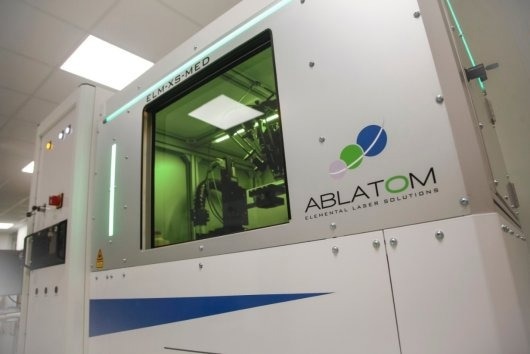Emerging from the Institut Lumière Matière (ILM), deeptech startup ABLATOM, a specialist in LIBS (Laser-Induced Breakdown Spectroscopy) technology, is announcing today the deployment of the world’s first biomedical LIBS microscope, ELM-XS-MED, at the Grenoble Alpes University Hospital (CHUGA). This breakthrough device, specifically designed for the analysis of patient biopsies, is the first in the world to be implemented and used in a hospital environment. Using LIBS technology, it enables extremely precise, rapid, and contactless chemical analysis of human tissue. This technological innovation promises to significantly enhance diagnostics for patients potentially exposed to toxic agents and accelerate our understanding of chronic diseases such as cancer.

Image Credit: ABLATOM
ABLATOM: The Deeptech Company Revolutionizing LIBS Technology with World Firsts
ABLATOM was founded in 2017, from the meeting of Vincent Motto-Ros, a Researcher and Doctor at the origin of the optimization and development of LIBS analysis technology, and Florian Trichard, Doctor of Analytical Chemistry specialized in LIBS and bearer of the project to create the company. Its mission, in France and internationally: to design, develop, and deliver cutting-edge, customized chemical analysis solutions, from laboratory to industry, advancing chemical material characterization for the future.
Leveraging its partnership with ILM, ABLATOM offers a patented, versatile new generation of LIBS instrumentation that pushes the boundaries of chemical analysis and imaging. Robust, reliable, and high-performing, the technology is built on 15 years of R&D and applications across sectors, from geosciences and biomedicine to industry, including nuclear, metallurgy, chemistry, and recycling. These solutions enable researchers and industry professionals to increase productivity, boost competitiveness, and open new avenues for exploration while expanding their chemical analysis capabilities.
Florian Trichard, President and Founder of ABLATOM, said, “This breakthrough it is line with our mission to provide disruptive analytical solutions to major societal issues. Our ELM-XS-I is a high-performance LIBS microscope. It is already deployed in the Physical Analysis Division at IFP Energies Nouvelles (Solaize, France) where it is dedicated to the analysis of materials in New Energy Technologies (batteries, plastics, catalysts, etc.). After this world-first, it was natural for ABLATOM to pursue our commitment with this biomedical LIBS microscope. We will continue to impact key sectors such as healthcare, energy or critical resources by developing disruptive tools to meet the challenges of today and tomorrow.”
ABLATOM Launches the First Biomedical LIBS Microscope in a Hospital Setting
Having pioneered the latest advances in LIBS elemental analysis and imaging, ABLATOM and its long-standing partner, ILM, are now addressing a critical public health need by redefining the detection and observation capabilities for toxic mineral and metal elements in human tissue.
Purchased by the Université Grenoble Alpes through a public tender and hosted at CHU Grenoble Alpes, this LIBS microscope opens new perspectives for biomedical research by directly analyzing the elemental composition of biological tissues from animals or humans. This cutting-edge instrument will be at the forefront of numerous research projects in pulmonology, dermatology, and oncology, as well as in the development of medical nanoparticles for preclinical laboratory or regulatory studies.
Ultimately, it is expected to facilitate faster, more accurate, and comprehensive diagnostics while improving patient care for those exposed to environmental risks.
This innovative project was spearheaded by Prof. Benoit Busser, Professor at Université Grenoble Alpes and CHU Grenoble Alpes, with Dr. Lucie Sancey, Research Director at CNRS at IBA Grenoble, and Dr. Vincent Motto-Ros, ILM Researcher, Associate Professor, and co-founder of ABLATOM,with support from Université Grenoble Alpes. It positions France as a leader in the medical application of LIBS spectroscopy technology. This synergy with startup ABLATOM exemplifies a successful alliance between academic research and industrial innovation.
How It Works
LIBS technology is a fully optical analytical technique that reveals the chemical composition of any state of matter (solid, liquid, gas) in just a few milliseconds. It works by focusing a very brief laser pulse to sample a fraction of material, leading to the formation of a plasma. Analyzing the optical emissions from this plasma allows for the detection, identification, mapping, and quantification of the chemical elements in the material. Its key competitive advantages are:
- Samples, excites and detects in a single process
- Reveals the chemical composition of matter almost instantaneously
- Detects both endogenous and exogenous elements, including light elements
- Large-area mapping on a cellular scale